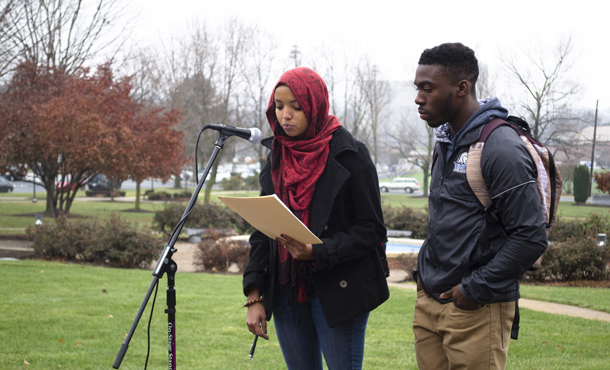Philip Watson Jr. ‘16 has found a new mission — from hoping to become an Olympian himself to helping others perform on the world’s biggest sports stage. Watson, a citizen of Liberia, initially trained to drop his 200m and 400m times in hopes of representing the country on the Liberian national track and field team.
At the same time, his former teammate Connor Faint ‘18 was selected as a guide runner on the U.S. Paralympic Team and began working at the Chula Vista Elite Athlete Training Center in Chula Vista, Calif. (Faint traveled internationally with the team during 2019.)
Intrigued by this opportunity, Watson did some research, contacting Liberia’s lead Paralympic team organizer, Festus Robinson. He quickly learned that the team lacked resources and support.
“My reasons began to evolve … and it became more about creating better opportunities for this particular population in Liberia,” Watson said during a phone interview from Hershey, Pennsylvania.

He has two goals: First he hopes to raise funds for two athletes and a delegation to attend the Paralympics, beginning Aug. 24, 2021, in Tokyo, Japan.
Watson is also advocating for a more long-term goal of helping to sustain and support Paralympic athletes. Robinson has purchased 10 acres of land, on which he hopes to build a village where athletes, support staff, and coaches from different sports can live and train. The 10-acre compound is planted with cocoa beans, which when harvested and sold would provide income.
A commitment to ‘unsung heroes’
Watson juggles advocacy efforts between his full-time work as a supervisory staff member in Milton Hershey School’s transitional living program and monthly service commitments with the Air Force Reserve.

Those who know him from his years at EMU will recognize a consistent commitment to advocacy for others. Watson graduated with a BA in psychology and Cords of Distinction honors for service to the Black Student Union, EMU’s Diversity Taskforce, and the broader campus community. One of his accomplishments was bringing recognition to Dr. Abraham Davis, the first director of the Cross-Cultural Center, the precursor to today’s Multicultural and International Student Services.
This recent focus tracks to a similar theme: bringing deserved recognition to and uplifting the voices and experiences of people like Davis who Watson calls “unsung heroes.”
Fundraising effort
Watson says people with disabilities in Liberia often face discrimination and marginalization. The pandemic has made life especially challenging for Paralympic athletes. The team itself suffers from lack of media attention and resources from the government.

Yet the Paralympic team has stayed their course, broadening their affiliations, for example, by joining the International Wheelchair Basketball Foundation in January 2021. And even amidst the bureaucratic slow-down, the delegation has successfully finalized paperwork to travel to Tokyo.
Javelin throwers Mulbah and Patience Johnson, with their coaches and delegates, are ready to go, but the team lacks the funds for travel, equipment and uniforms.
“We definitely don’t get the same recognition that the able-bodied team gets,” Watson added.
Watson hopes to raise $30,000 by Aug. 16 through a GoFundMe account.
It’s fair to note that the Liberian Olympic team is relatively under resourced as well. Since 1956, Liberia has typically sent one of the smaller contingents. The Tokyo team, consisting of a female hurdler and two male sprinters, received their first major media attention, according to “Go Team Liberia” website’s Janelle Addy, for their opening ceremony uniforms, designed by Liberian-American celebrity Telfar Clemens. [See New York Times video coverage here.]
Notably, Go Team Liberia is a main source of information about the national team — Addy started the website in 2008 to keep fans updated on the performance of her brother, decathlete Janzy Addy. She has continued maintaining the site and was the main advocate who connected the fashion designer Clemens to the team. In recent media coverage, she names his relationship with Team Liberia as its first “sponsorship.”

As difficult as it has been for the able-bodied athletes, Watson points out that “at the end of the day, if we are all trying to represent Liberia, shouldn’t the [Paralympic athletes] have the same attention, recognition, and access to resources?”
At the time of publication, Watson says team representatives are still hoping for responses to appeals for financial commitment from several organizations.
Notably, Liberia sent its first Paralympic athlete, weightlifter James “Bobby the Big” Siaffra, to the London 2012 games. That Olympiad also generated EMU’s closest connection: alumna Leymah Gbowee, Nobel Peace Laureate from Liberia, was a flagbearer with other humanitarian activists during the opening ceremonies.
Watson hopes efforts help to build on these two legacies. And when the Paralympic track and field program grows, he hopes to be there with the athletes to coach — and guide.
